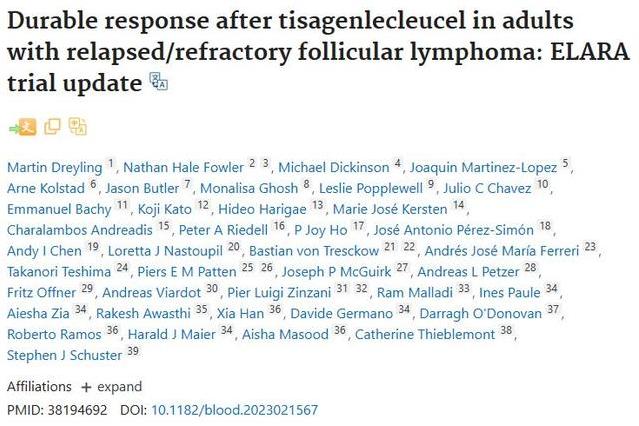Long Term Efficacy of CAR-T Novartis Kymriah (Tisagenlecleucel) in the Treatment of Relapsed or Refractory Follicular Lymphoma (R / R FL)
Long Term Efficacy of CAR-T Novartis Kymriah (Tisagenlecleucel) in the Treatment of Relapsed or Refractory Follicular Lymphoma (R / R FL)
Kymriah (Tisagenlecleucel) is a CAR-T cell immunotherapy co-developed by the University of Pennsylvania and Novartis, a revolutionary immunocellular therapy.
This article provides an in-depth analysis of the long-term efficacy and safety of Tisagenlecleucel (a CAR-T therapy) in the treatment of relapsed or refractory follicular lymphoma (r/r FL), and shares the latest clinical trial results. This study not only provides patients with a new treatment option but also aids the development of precision medicine by exploring biomarkers associated with therapeutic efficacy.

Follicular lymphoma (FL), a common subtype of non-Hodgkin’s lymphoma, has a high initial response rate to treatment, but FL patients often face high disease recurrence. With each recurrence, patients’ response to treatment gradually diminishes, affecting treatment efficacy and quality of life.
In April 2024, the journal Blood published an article titled “Durable response after Tisagenlecleucel in adults with relapsed/refractory follicular lymphoma: ELARA trial update,” which revealed the latest data on Tisagenlecleucel in the treatment of r/r FL, providing a new direction for therapeutic strategies in FL.
Study Methods
The ELARA study was a multicenter, single-arm, phase II clinical trial aimed at evaluating the long-term efficacy and safety of Tisagenlecleucel in adult patients with r/r FL. The study enrolled 97 patients who had received at least two lines of treatment or had relapsed after autologous stem cell transplantation. All patients received a single-dose infusion of Tisagenlecleucel, ranging from 0.6 × 10^8 to 6 × 10^8 chimeric antigen receptor (CAR)-positive viable T cells. The study allowed bridging chemotherapy, and patients underwent detailed clinical and biological marker analyses before and after infusion.
Study Results
Significant Long-Term Efficacy
The results showed that after a median follow-up of 29 months, the median progression-free survival (PFS), duration of response (DoR), and overall survival (OS) were not reached, indicating that a considerable proportion of patients remained alive and stable two years after treatment. Specifically, the 24-month PFS rate was 57.4%, the DoR rate was 66.4%, and the OS rate was 87.7%. These data demonstrate a significant improvement in efficacy compared to previous treatments.
High Response Rates
In terms of response rates, the complete response rate (CRR) and overall response rate (ORR) were 68.1% and 86.2%, respectively, which are outstanding results in the treatment of r/r FL. Notably, Tisagenlecleucel displayed excellent efficacy even in patients with high-risk disease features, such as POD24 (disease progression within 24 months after initial immunochemotherapy) and high tumor burden. Among POD24 patients, the ORR was 82%, and the CRR was 59%.
Good Safety Profile
In the long-term follow-up analysis of Tisagenlecleucel, no new safety signals or treatment-related deaths were identified, further confirming the safety of this therapy. In terms of any-grade infections, 16.5% of patients experienced infectious symptoms, with 9.3% experiencing grade 3 or higher severe infections. Furthermore, over time, most patients (82.0%) resolved any cytopenias within 6 months, and by 24 months, the probability of resolving any cytopenia reached 96.7%.
Potential Value of Biomarkers
The study conducted exploratory analyses on various biomarkers and found that lower levels of LAG3+CD3+ exhausted T cells and higher levels of naïve CD8+ T cells were significantly associated with improved efficacy. These findings provide essential biomarkers for future personalized medicine, aiding in the identification of patients more likely to benefit from Tisagenlecleucel treatment.
Low Doses Still Effective
Although no clear dose-response relationship was observed in the study, Tisagenlecleucel demonstrated good efficacy across a wide range of doses. This suggests that even at lower doses, Tisagenlecleucel may offer clinical benefits to patients.
Cellular Kinetics of Long-Term Efficacy
Using quantitative polymerase chain reaction (qPCR), the researchers evaluated the cellular kinetics of Tisagenlecleucel in patients’ bodies, revealing that the CAR transgene could persist for up to 925 days. While the relationship between the long-term persistence of the CAR transgene and long-term clinical efficacy remains unclear, this provides evidence for the durability of CAR-T cell therapy.
Feasibility of Outpatient Treatment
The authors also explored the feasibility of outpatient treatment with Tisagenlecleucel. At some of the clinical trial centers participating in the study, a portion of patients received treatment on an outpatient basis, and most patients did not require hospitalization after treatment. This finding suggests that for eligible patients, outpatient treatment may be a safe and viable option, helping to reduce the economic and time burden on patients.
Conclusion
This article provides an in-depth analysis of the long-term efficacy of Tisagenlecleucel in the treatment of r/r FL and explores potential biomarkers that may influence therapeutic efficacy. This study not only offers a new treatment option for r/r FL patients but also provides valuable information for future personalized medicine. While the study yielded positive results, further research is needed to validate these findings and explore the efficacy and safety of Tisagenlecleucel in a broader patient population. Furthermore, the potential for outpatient treatment with Tisagenlecleucel mentioned in the study could provide a new approach to reducing hospitalization time and the utilization of medical resources. As more long-term follow-up data accumulate, Tisagenlecleucel holds promise as a new standard treatment option for patients with r/r FL.
Reference
Dreyling M, Fowler NH, Dickinson M, et al. Durable response after tisagenlecleucel in adults with relapsed/refractory follicular lymphoma: ELARA trial update [J]. Blood. 2024;143(17):1713-1725. doi:10.1182/blood.2023021567IF: 20.3 Q1
Content Source:CHTV百姓健康频道
